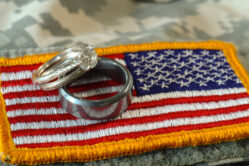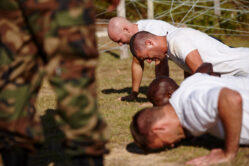A family care plan is legal paperwork that military families can use to designate emergency contacts and temporary guardians for children in case of emergencies. It also lists any allergy or special needs for your children that first responders should be aware of.
Any service member who is a single parent or in a dual-military marriage is required to complete the document. There must be designated caregivers any time the service member is at work. Each military branch and installation may have their own versions of the plan, so check with them first.
Using a Family Care Plan During Deployment
Military families can use a family care plan to prepare for deployment, even if one parent plans to stay home with the kids the entire time. In an emergency situation, the fastest way to communicate with the deployed service member is through a Red Cross message. However, it could take days to bring the deployed spouse home to respond to a family medical crisis.
The family care plan lists emergency contacts who are in your local area and can respond quickly if needed. The paperwork also specifies adults who will be responsible for your children for a longer term if you spend a few days in the hospital. Having a family care plan in place ensures that your children won’t be sent to emergency foster care by the state.
Where to File Your Plan
The family care plan should be completed before deployment. Once you and your spouse have completed and signed your family care plan, ensure you file it with the correct authorities so it can be found in an emergency.
A copy of the family care plan should be kept with the military unit’s Family Readiness Group (FRG), Ombudsman or Family Readiness Officer (FRO). If a Red Cross message is used to contact the military unit, then the FRG will use the family care plan to contact your preferred family or friends who can care for your children.
Additional Precautions for Emergencies
You can also keep a copy of your family care plan in the glove compartment of your car so that first responders can find it quickly in the event of an accident. If you are worried that you would be unable to speak or offer instructions during an emergency situation, it is wise to keep a card in your wallet that is clearly marked “emergency contact” and contains the name and phone number of the military unit.
Finally, you can save a contact in your phone labeled ICE (in case of emergency), which is either the cellphone of the unit Family Readiness representative or the unit’s 24-hour duty number. Taking these precautions will help ensure that emergency responders will contact your deployed spouse as soon as possible. If you have your family care plan filed with the military unit, then your emergency contacts will be notified just as quickly as your spouse.
Pets and Your Family Care Plan
Currently, family care plans do not include pets. If you wish to make plans for someone to care for your pets in case of an emergency, you can do that without military paperwork. If you keep an emergency contact listed in your wallet or on your phone, include the number of a nearby friend or neighbor who has access to your house and would be able to feed your pets if you were unexpectedly in the hospital.
Taking care of these emergency plans before a deployment will put your mind at ease and let you know that your children will be taken care of no matter what happens to you.




About the comments on this site:
These responses are not provided or commissioned by the bank advertiser. Responses have not been reviewed, approved or otherwise endorsed by the bank advertiser. It is not the bank advertiser’s responsibility to ensure all posts and/or questions are answered.